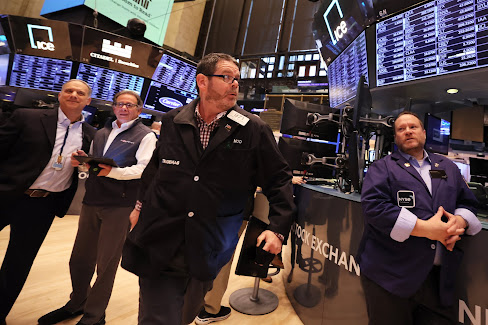Introduction:
On Monday, US stocks experienced minimal movement as President Joe Biden and House Republican Speaker Kevin McCarthy prepared to resume debt-ceiling negotiations. The market anxiously awaits the outcome of these discussions, as warnings of a disastrous default less than two weeks away loom overhead. This blog post examines the latest developments, market reactions, and potential implications of the ongoing debt-ceiling showdown.
Debt-Ceiling Negotiations:
As the debt-ceiling deadline draws near, President Joe Biden returned to Washington early from his Asia trip to resume talks. Treasury Secretary Janet Yellen has repeatedly emphasized the June 1 "X-date" deadline for default, intensifying concerns among investors. The negotiations take center stage as both sides strive to reach an agreement or secure an extension to avoid potential economic turmoil.
Market Reactions:
Wall Street displayed a cautious response to the debt-ceiling standoff. The S&P 500 saw a slight increase above the flatline at the opening, while the Dow Jones Industrial Average remained flat. The Nasdaq Composite, which is weighted towards technology companies, rose by 0.15%. However, with the risk of government default becoming more real, anxiety mounts, leading Wall Street banks and asset managers to prepare for the potential fallout of a default scenario.
Implications for Financial Markets:
The impending debt-ceiling crisis raises concerns about the stability of financial markets and the broader economy. If a resolution or extension is not achieved, the impact on the Treasury market could be significant. Currently, the yield on the two-year note has risen to 4.3%, while the 10-year Treasury yield trades at 3.69%. The uncertainty surrounding the debt ceiling creates a challenging environment for investors and prompts Wall Street to brace for potential adverse consequences.
Fed's Role and Interest Rates:
Minneapolis Fed President Neel Kashkari, a voting member of the Federal Reserve, signaled a willingness to hold interest rates steady in June. This approach allows the central bank to assess the impact of previous interest rate hikes on inflation. With several Fed board members scheduled to deliver speeches and the release of the minutes from the last policymakers' meeting on the horizon, the market looks to gain insights into the Fed's perspective on the current situation.
Upcoming Earnings Reports and Consumer Health:
This week, earnings reports from retailers Dollar General, Costco, and BJ's are highly anticipated. These reports will provide valuable insights into the health of the consumer, shedding light on consumer spending trends and overall economic resilience. The market will closely analyze these earnings to gauge the potential impact of the debt-ceiling negotiations on consumer sentiment and spending patterns.
Stock Movements:
Several individual stocks experienced notable movements in response to specific events. Micron Technology, Inc. saw a decline of approximately 4% after Beijing banned certain Chinese tech manufacturers from using the company's chips, heightening existing tensions between the US and China in the technology and security sectors. On the other hand, Meta Platforms, Inc., the parent company of Facebook, saw its shares rise after being fined a record €1.2 billion by the European Union for privacy violations and given a deadline to cease sending European users' data to the US. Additionally, Adani Enterprises, the flagship company of Adani Group, witnessed a significant surge of over 18% following a committee's clearance of regulatory allegations made by US short seller Hindenburg Research. Lastly, NVIDIA experienced a slight dip of over 1% after announcing its collaboration with the University of Bristol to build a new supercomputer using a new Nvidia processor, entering a market primarily dominated by Intel and Advanced Micro Devices.
Conclusion:
The ongoing debt-ceiling negotiations have left Wall Street on edge as the risk of a potential default looms. The market's cautious response reflects the mounting anxiety and uncertainty surrounding the situation. Investors are closely monitoring the progress of the talks, as a failure to reach an agreement or secure an extension could have significant implications for financial markets and the broader economy. The Federal Reserve's role and interest rate decisions will be pivotal in navigating the evolving landscape. Furthermore, upcoming earnings reports from key retailers will provide valuable insights into the health of the consumer and the potential impact of the negotiations on consumer sentiment and spending patterns. With individual stocks experiencing notable movements in response to specific events, the interconnectedness of global markets and geopolitical tensions becomes apparent. As Wall Street prepares for potential fallout, the outcome of the debt-ceiling negotiations will undoubtedly shape the trajectory of financial markets and have far-reaching consequences for all stakeholders involved.






Social Plugin